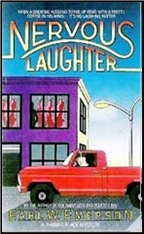Tue 15 Nov 2022
EARL EMERSON – Nervous Laughter. PI Thomas Black #3. Avon, paperback original, 1986, 1995 (shown). Fawcett, paperback, 1997.
P.I. Thomas Black (not to be confused with PI novelist Thomas Black (read more here ) is a Seattle-based private detective working in the contemporary world.

I like it when writers set their work contemporaneously. To me, it’s this world I’m struggling with — not the world of yesteryear. And by “I†I mean “me the reader.†So if I’m looking for answers: for how to live in this world with a modicum of self-respect; for how to make it thru the day — I want a book that is dealing with the ‘present’. Hopefully heroically. “I want you to show me the way†Peter Frampton, or whoever else happens to have a map.
Plus I think it’s a cheat to steal a past that no living reader can possibly remember. If you’re talking 1930, say whatever you want. All I know is what I read in Hammett and see in the movies the same as you, dear author. So you copy Hammett’s setting and make a slightly new version. Big freaking deal.
But you wanna talk 70’s to 2022? I know those times because I’ve lived thru them. So you’re going to have to be credible. You’re gonna have to be real — not Disneyfied.
Black is hired by a gorgeous and flirty jilted wife to tag her hubbie, a dog food mogul, on a suspicion of adultery job. The target immediately kills himself and his lover in a murder suicide. Case closed.
Or is it? Aye — and thar’s the rub.
So how was the book? It’s just okay. There’s nothing wrong with it. It’s real and it’s credible. It’s captivating and hard to put down. It makes sense and everything. But I’m struggling to remember even now, a couple days after shutting the covers. It’s disposable. (Except for getting rid of the bad guy by turning him into canned dog food — that I might remember, ironically: disposing of the disposable bad guy by literally canning him for sale on grocery store shelves).
But the thing with these common, disposable potboilers is they give the listless reader a list. A teleology. A toward-which. An ending. A goal. A solution. A forward momentum towards which you move. Chapter to chapter. Impelled towards the final page with a trajectory of movement into the future.
Books like this take the lost and wayward reader and plunks them down on one of those walking sidewalks at the airport. While you’re reading it, you’re no longer lost. You’ve got a specific place to go. Or at least a fear in back of you, scaring you into scurrying on ahead into the unknown but surely better than whatever fate is chasing you from behind.
I used to work in a bookstore where the staff was roiled by a manager who insisted upon referring to the books as ‘product’. The bibliophile wants to rescue the book from the world of commodities and make of it a fetish, free from this world of objects, existing solely in the soul. In ‘the life of the mind’ (to quote Barton Fink).
But this type of book is surely a commodity. Kind of like crack or speed or anti-depressants. It’s a salve for what ails you. But temporary. And disposable.
And as soon as you’re done you need another just like it. Forevermore. Til death do us part.
November 15th, 2022 at 9:19 pm
Ultimately too contemporary and transitory for me. I don’t mind disposable, but with Emerson I found myself losing track during the reading.
Maybe it was the time period. There were just too many better choices that fit me better at the time. I probably should have given this a better chance, but it didn’t get to me enough to keep turning pages.
Horse races, we all get different things out of books. This one tried but didn’t get me there.
November 15th, 2022 at 10:16 pm
Likewise, I’m sure. I enjoyed the Thomas Black books I read when I read them, but like Tony, I had a tough job remembering a lot about them a month or so later.
November 17th, 2022 at 4:15 pm
For anyone who doesn’t get the Barton Fink reference….https://media.giphy.com/media/9VeRRJkxCl8ChysTDM/giphy.gif
November 17th, 2022 at 10:10 pm
Enjoyable, but as said, disposable.
I remember that I thought one was far better than the others. But I’m damned if I can even recall which one it was.
November 17th, 2022 at 11:18 pm
I wonder if it could have been THE RAINY CITY, the first one in the series. I remember reading it when it first came out, and enjoying it a lot. And first efforts are sometimes an author’s best.
November 18th, 2022 at 5:57 am
I liked Black Hearts and Slow Dancing (1988).
It was surreal! And inventive.